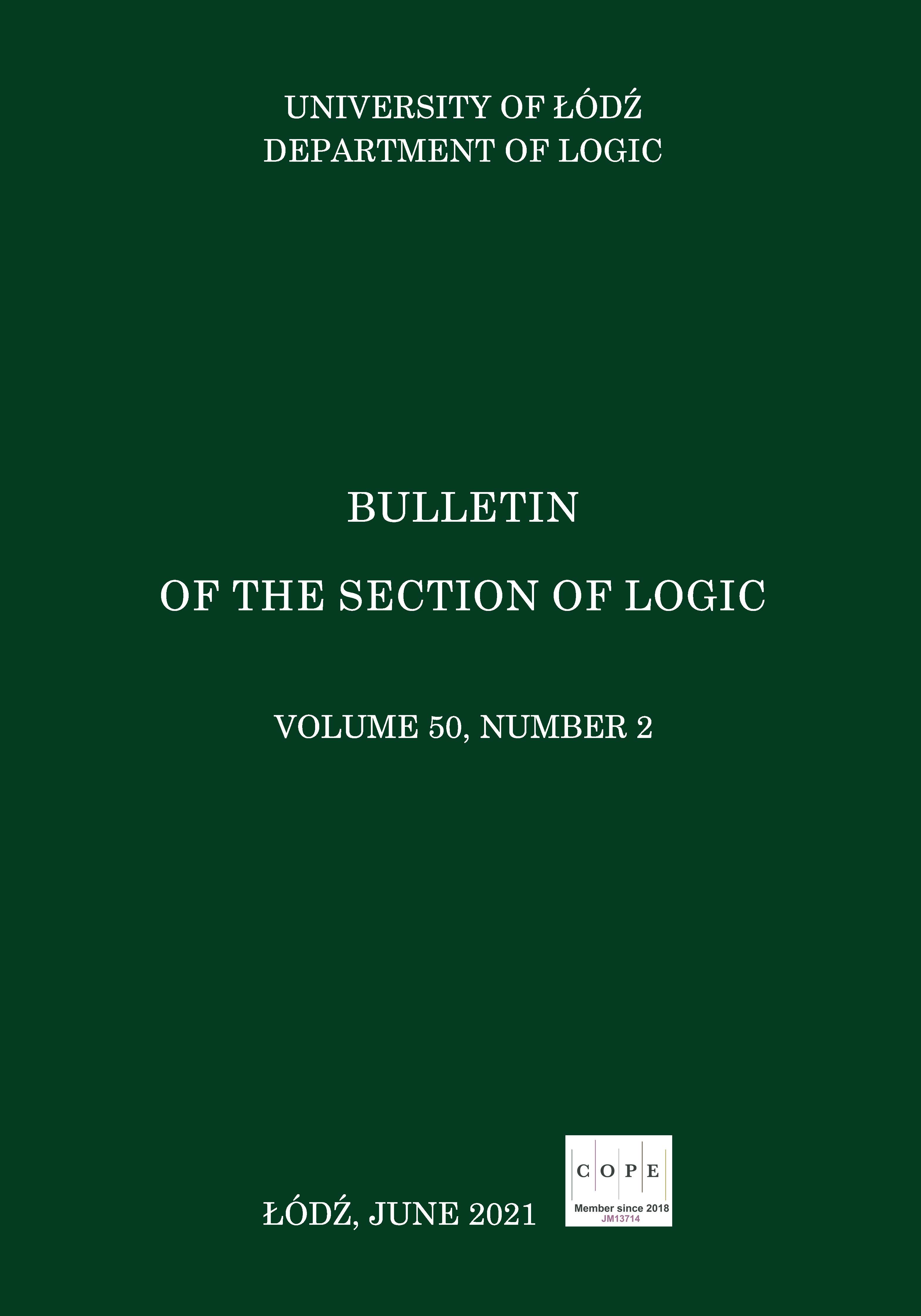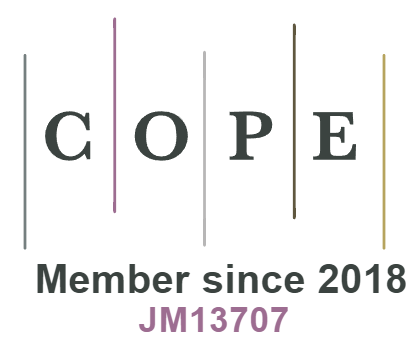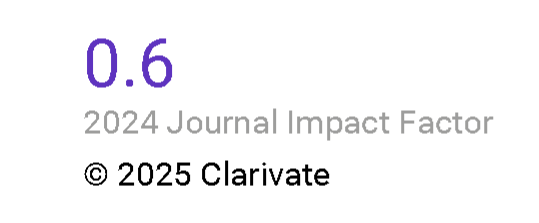Tableau Systems for Epistemic Positional Logics
DOI:
https://doi.org/10.18778/0138-0680.2021.06Keywords:
epistemic logic, logical omniscience, positional logic, tableau systemAbstract
The goal of the article is twofold. The first one is to provide logics based on positional semantics which will be suitable for the analysis of epistemic modalities such as ‘agent ... knows/beliefs that ...’. The second one is to define tableau systems
for such logics. Firstly, we present the minimal positional logic MR. Then, we change the notion of formulas and semantics in order to consider iterations of the operator of realization and “free” classical formulas. After that, we move on to weaker logics in order to avoid the well known problem of logical omniscience. At the same time, we keep the positional counterparts of modal axioms (T), (4) and (5). For all of the considered logics we present sound and complete tableau systems.
References
[1] T. Jarmużek, Minimal Logical Systems With R-operator: Their Metalogical Properties and Ways of Extensions, [in:] J. Bézieau, A. Costa-Leite (eds.), Perspectives on Universal Logic, Polimetrica Publisher (2007), pp. 319–333.
Google Scholar
[2] T. Jarmużek, Tableau Metatheorem for Modal Logics, [in:] R. Ciuni, H. Wansing, C. Willkommen (eds.), Trends in Logic Vol. 41. Recent Trends in Philosophical Logic, Springer International Publishing (2014), pp. 103–126, DOI: https://doi.org/10.1007/978-3-319-06080-4_8
Google Scholar
DOI: https://doi.org/10.1007/978-3-319-06080-4_8
[3] T. Jarmużek, On the Sea Battle Tomorrow That May Not Happen, Peter Lang, Berlin (2018), DOI: https://doi.org/10.3726/b14343
Google Scholar
DOI: https://doi.org/10.3726/b14343
[4] T. Jarmużek, M. Klonowski, Some Intensional Logics Defined by Relating Semantics and Tableau Systems, [in:] A. Giordani, J. Malinowski (eds.), Logic in High Definition. Current Issues in Logical Semantics, Springer International Publishing (2021), pp. 31–48, DOI: https://doi.org/10.1007/978-3-030-53487-5_3
Google Scholar
DOI: https://doi.org/10.1007/978-3-030-53487-5_3
[5] T. Jarmużek, A. Parol, On Some Language Extension of Logic MR: A Semantic and Tableau Approach, Roczniki Filozoficzne, vol. 68 (2021), pp. 345–366, DOI: https://doi.org/10.18290/rf20684-16
Google Scholar
DOI: https://doi.org/10.18290/rf20684-16
[6] T. Jarmużek, A. Pietruszczak, Completeness of Minimal Positional Calculus, Logic and Logical Philosophy, vol. 13 (2004), pp. 147–162, DOI: https://doi.org/10.12775/LLP.2004.009
Google Scholar
DOI: https://doi.org/10.12775/LLP.2004.009
[7] T. Jarmużek, M. Tkaczyk, Normalne logiki pozycyjne (Normal Positional Logics), Wydawnictwo KUL, Lublin (2015).
Google Scholar
[8] T. Jarmużek, M. Tkaczyk, Expressive Power of the Positional Operator R: a Case Study in Modal Logic and Modal Philosophy, Ruch Filozoficzny, vol. 75 (2019), pp. 93–107, DOI: https://doi.org/10.12775/RF.2019.022
Google Scholar
DOI: https://doi.org/10.12775/RF.2019.022
[9] A. Karczewska, Maximality of the Minimal R-Logic, Logic and Logical Philosophy, vol. 27 (2017), pp. 193–203, DOI: https://doi.org/10.12775/LLP.2017.008
Google Scholar
DOI: https://doi.org/10.12775/LLP.2017.008
[10] J. Łos, Podstawy analizy metodologicznej kanonów Milla (The Foundations of Methodological Analysis of Mill’s Canons), Annales Universitatis Mariae Curie-Skłodowska, vol. 2 (1947), pp. 269–301.
Google Scholar
[11] J. Łos, Logiki wielowartosciowe a formalizacja funkcji intensjonalnych (Many-Valued Logics and Formalization of Intensional Functions), Kwartalnik Filozoficzny, vol. 17(1) (1948), pp. 59–68.
Google Scholar
[12] J. Malinowski, K. Pietrowicz, J. Szalacha-Jarmuzek, Logic of Social Ontology and Łos’s Operator, Logic and Logical Philosophy, vol. 29 (2020), pp. 239–258, DOI: https://doi.org/10.12775/LLP.2020.005
Google Scholar
DOI: https://doi.org/10.12775/LLP.2020.005
[13] J. Meyer, Epistemic Logic, [in:] L. Goble (ed.), The Blackwell Guide to Philosophical Logic, Blackwell (2001), pp. 183–202, DOI: https://doi.org/10.1002/9781405164801
Google Scholar
DOI: https://doi.org/10.1111/b.9780631206934.2001.00012.x
[14] G. Priest, An Introduction to Non-Classical Logic. From If to Is. 2nd ed, Cambridge University Press, Cambridge (2008), DOI: https://doi.org/10.1017/CBO9780511801174
Google Scholar
DOI: https://doi.org/10.1017/CBO9780511801174
[15] N. Rescher, On the Logic of Chronological Propositions, Mind, vol. 75(297) (1966), pp. 75–96, DOI: https://doi.org/10.2307/2251711
Google Scholar
DOI: https://doi.org/10.1093/mind/LXXV.297.75
[16] N. Rescher, Topological Logic, [in:] Topics in Philosophical Logic, Reidel Publishing Company, Dordrecht (1968), pp. 229–249, DOI: https://doi.org/10.1007/978-94-017-3546-9_13
Google Scholar
DOI: https://doi.org/10.1007/978-94-017-3546-9_13
[17] N. Rescher, A. Urquhart, Temporal Logic, Springer Verlag, Vienna–New York (1971).
Google Scholar
DOI: https://doi.org/10.1007/978-3-7091-7664-1
[18] M. Tkaczyk, Logika czasu empirycznego: funktor realizacji czasowej w językach teorii fizykalnych (Logic of Empirical Time: Functor of Temporal Realisation in the Languages of Phisical Theories), Wydawnictwo KUL, Lublin (2009).
Google Scholar
[19] M. Tkaczyk, Negation in Weak Positional Calculi, Logic and Logical Philosophy, vol. 22 (2013), pp. 3–19, DOI: https://doi.org/10.12775/LLP.2013001
Google Scholar
DOI: https://doi.org/10.12775/LLP.2013.001
[20] M. Tkaczyk, Distribution Laws in Weak Positional Logics, Roczniki Filozoficzne, vol. 66 (2018), pp. 163–179, DOI: https://doi.org/10.18290/rf.2018.66.3-8
Google Scholar
DOI: https://doi.org/10.18290/rf.2018.66.3-8
Downloads
Published
How to Cite
Issue
Section
License

This work is licensed under a Creative Commons Attribution-NoDerivatives 4.0 International License.















